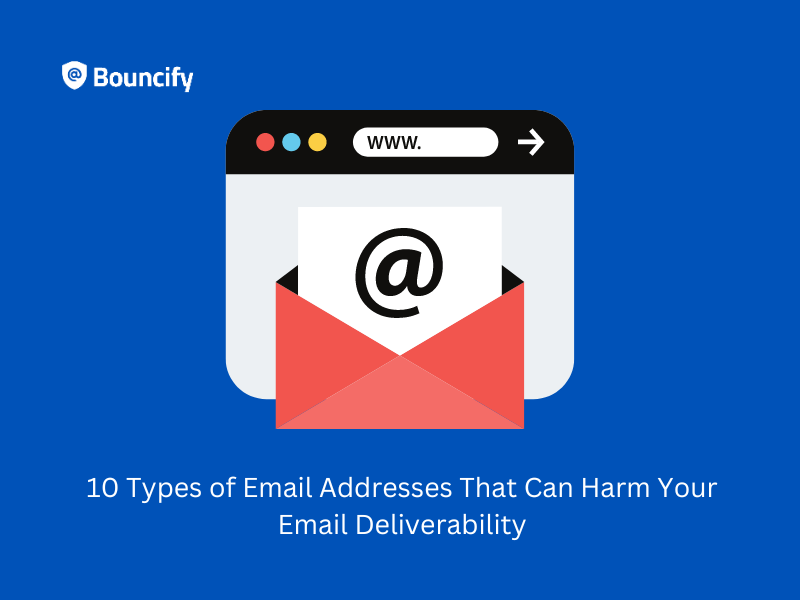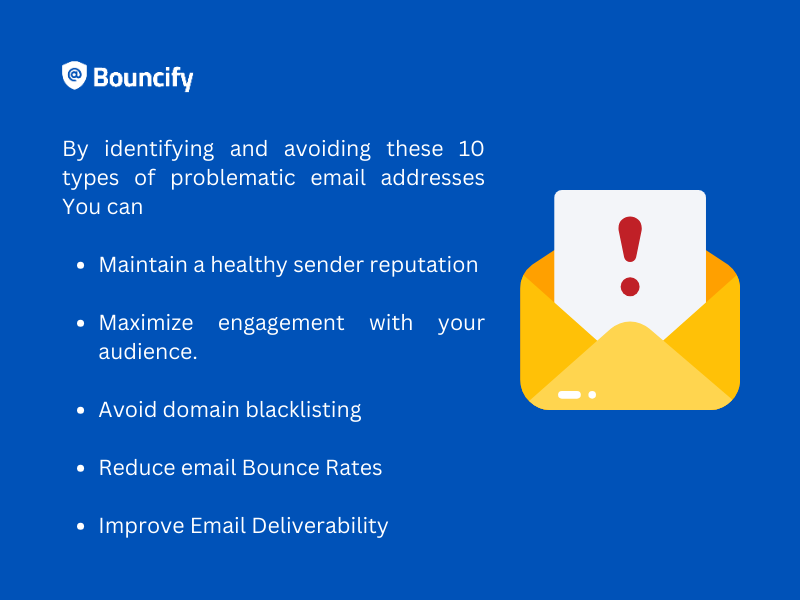10 Types of Email Addresses That Can Harm Your Email Deliverability

In the realm of email marketing, achieving optimal deliverability is paramount for the success of your campaigns. However, not all email addresses are created equal, and certain types can actually hinder your efforts rather than propel them forward.
Understanding these email address types is essential for maintaining a healthy sender reputation and maximizing engagement with your audience. In this guide, we'll explore 10 types of email addresses that can pose a threat to your email deliverability, equipping you with the knowledge needed to navigate the intricacies of email marketing more effectively.
1. Syntax Error Email Addresses
Syntax Error email addresses are those that contain formatting errors, such as missing "@" symbols or incorrect domain names. Sending emails to these addresses will result in hard bounces, harming your sender reputation and deliverability rates.
2. Disposable Email Addresses
Disposable email addresses are temporary email accounts often used for one-time registrations or spam prevention. While they may initially appear valid, they are often discarded after a short period, leading to high bounce rates and low engagement.
3. Role-Based Email Addresses
Role-based email addresses, such as "info@domain.com" or "support@domain.com," are associated with a particular function or department rather than an individual. Sending emails to these addresses can result in lower engagement as they are often managed by multiple users or automated systems.

Ready to improve your email deliverability? Sign up now and verify your emails with us for free.
4. Typo-Squatting Email Addresses
Typo-squatting email addresses are created to mimic legitimate email addresses but contain slight misspellings or variations. These addresses are often used by scammers to intercept sensitive information or conduct phishing attacks.
5. Spam Trap Email Addresses
Spam trap email addresses are specifically designed to catch spammers and identify senders with poor list hygiene. Sending emails to these addresses can result in immediate blacklisting and damage to your sender reputation.
6. Honeypot Email Addresses
Honeypot email addresses are hidden traps set by ISPs and anti-spam organizations to identify senders with poor list hygiene practices. Sending emails to these addresses can trigger spam filters and lead to deliverability issues.

7. Stale Email Addresses
Stale email addresses are those that have not been engaged with for an extended period. Continuously sending emails to these addresses can result in decreased engagement rates and higher bounce rates.
8. Suspicious Email Addresses
Suspicious email addresses exhibit unusual patterns or behaviors, such as irregular formatting or inconsistent domain names. Sending emails to these addresses can raise red flags with ISPs and lead to deliverability issues.

Ready to improve your email deliverability? Sign up now and verify your emails with us for free.
9. Internationalized Email Addresses
Internationalized email addresses contain non-ASCII characters, such as accents or special symbols. While they may be valid, not all email systems support internationalized addresses, leading to delivery failures.
10. Blacklisted Email Addresses
Blacklisted email addresses are those that have been flagged as spammy or malicious by ISPs or anti-spam organizations. Sending emails to these addresses can result in immediate blacklisting and damage to your sender reputation.
Conclusion
Navigating the intricacies of email deliverability requires vigilance and attention to detail, particularly when it comes to the types of email addresses you're sending to.
When it comes to identifying invalid email addresses, Bouncify stands as a valuable ally in your email marketing arsenal. With its advanced email verification capabilities, Bouncify employs real-time checks to meticulously scrutinize email addresses for accuracy and validity.

Ready to improve your email deliverability? Sign up now and verify your emails with us for free.
By leveraging cutting-edge technology, Bouncify swiftly identifies invalid email addresses, disposable addresses, spam traps, and other problematic types, ensuring that your email campaigns are only sent to genuine and engaged recipients. This not only enhances your email delivery rates but also safeguards your sender reputation and maximizes the effectiveness of your email marketing endeavors.
With Bouncify, you can navigate the complexities of email deliverability with confidence, knowing that your campaigns are built on a foundation of accuracy and reliability.
In conclusion, maintaining a strong understanding of the various categories of problematic email addresses is crucial for ensuring the success of your email marketing efforts. By identifying and avoiding these types of addresses, you can significantly improve your email delivery efficiency and overall campaign performance.